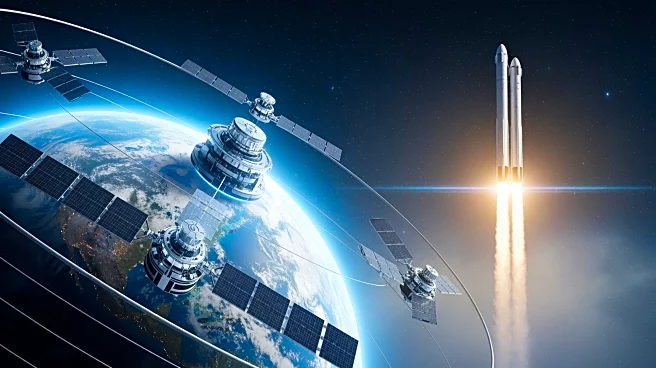What's Happening?
SpaceX, led by Elon Musk, has reached significant milestones with the launch of its 10,000th Starlink satellite and the record-setting 31st flight of its Falcon 9 booster. On October 19, 2025, a Falcon 9 rocket was launched from Cape Canaveral Space Force
Station, deploying 28 Starlink satellites into low Earth orbit. This launch marked the 10,000th satellite deployed by SpaceX, according to satellite tracker Jonathan McDowell. The Falcon 9 booster, designated as Booster 1067, successfully completed its 31st mission, landing on the drone ship A Shortfall of Gravitas in the Atlantic Ocean. SpaceX emphasized that each successful landing and reuse of the booster helps lower costs and increase access to space. The upper stage of the rocket deployed all 28 satellites approximately 64 minutes after liftoff, contributing to the operational Starlink satellites that provide internet worldwide.
Why It's Important?
The achievement of deploying 10,000 Starlink satellites underscores SpaceX's commitment to expanding global internet access through its Starlink constellation. This milestone is significant for the satellite internet industry, as it demonstrates the rapid pace of deployment and technological advancements in reusable rocket technology. The successful reuse of the Falcon 9 booster highlights SpaceX's ability to reduce costs and improve efficiency in space missions, potentially influencing future commercial space endeavors. The expansion of Starlink's satellite network is poised to enhance internet connectivity in remote and underserved regions, offering potential benefits to global communication infrastructure and economic development.
What's Next?
SpaceX's Starlink service is facing scrutiny from a bipartisan U.S. Congressional committee investigating its alleged involvement in providing internet access to scam centers in Myanmar. The inquiry could lead to further regulatory challenges for SpaceX, with the possibility of Elon Musk being compelled to testify. Despite this, Starlink continues to expand its services, recently supporting continuous video calls, messaging, and data through direct-to-cell technology for T-Mobile US subscribers. As Starlink grows its customer base, reaching 7 million users worldwide, SpaceX is likely to focus on further expanding its satellite network and enhancing service capabilities.
Beyond the Headlines
The investigation into Starlink's operations in Myanmar raises ethical and legal questions about the use of satellite internet services in regions with complex geopolitical issues. The potential misuse of Starlink's technology for fraudulent activities highlights the need for robust oversight and accountability in the satellite internet industry. Additionally, the rapid expansion of Starlink's network could lead to long-term shifts in global internet access, potentially challenging traditional telecommunications providers and reshaping the landscape of global connectivity.















